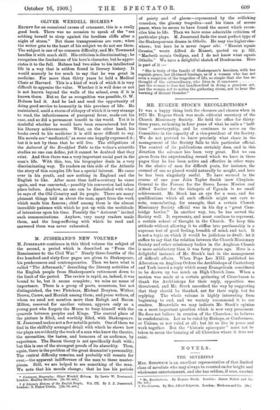MR. EUGENE STOCK'S RECOLLECTIONS.*
IT was a happy thing both for choosers and chosen when in 1873 Mr. Eugene Stock was made editorial secretary of the Church Missionary Society. He held the office for thirty- three years, reckoning in four years of what he calls a " half- time " secretaryship, and he continues to serve on the Committee in the capacity of a vice-president of the Society. We do not pretend to know precisely what share in the management of the Society falls to this particular official. The control of its publications certainly does, and in this direction the advance has been very great. But we can guess from the unpretending record which we have in these pages that he has been active and effective in other ways. In the choice of men for difficult posts, for instance, the counsel of one so placed would naturally be sought, and here he has been singularly useful. To have secured in the course of one year John Taylor Smith (now Chaplain- General to the Forces) for the Sierra Leone Mission and Alfred Tucker for the bishopric of Uganda is no small achievement. Mr. Stock has an eye for a man, and for qualifications which all such officials might not care to note, remembering, for example, that a certain Church Missionary Society official was in his day a " great Cam- bridge bowler." In another way, too, he has served the Society well. It represents, and must continue to represent, a certain school of thought in the Church. To keep this attitude without allowing it to stiffen into partisanship is a supreme test of good feeling, breadth of mind, and tact. It is not a topic on which it would be judicious to dwell : let it suffice to say that the relation between the Church Missionary Society and other missionary bodies in the Anglican Church is more satisfactory than it was forty years ago. Here is a delightful instance of Mr. Stock's tact in the management of difficult affairs. When Pope Leo XIII. published his Allocution on Anglican Orders the Archbishops of Canterbury and York issued a reply which many Evangelicals considered to be drawn up too much on High Church lines. When a motion was made at a certain gathering of Churchmen to thank the Archbishops for their reply, opposition was threatened, and Mr. Stock smoothed the way by suggesting that they should be thanked, not for their reply, but for replying. The whole volume is highly interesting from beginning to end, and we warmly recommend it to our readers. Meanwhile we may indicate Mr. Stock's opinion on a most important question which is now very prominent. He does not believe in reunion of the Churches ; he believes in confederation. Let us be ruled by Bishops, or Conferences, or Unions, or not ruled at all ; but let us live in peace and work together. But the "historic episcopate" must not be taken to mean the banning of all Churches where it does not exist.














































 Previous page
Previous page